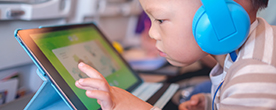Parents and families of children in care with a disability
Child Safety works with families, carers, the National Disability Insurance Agency (NDIA), mainstream Queensland Government agencies and service providers to ensure children and young people with disability across all child protection phases have access to disability supports to meet their needs.
Access for your child to the NDIS
We are responsible for ensuring all eligible children and young people in care with a disability or developmental delay can access the NDIS and receive NDIS support where eligible.
For children under 9 years with development concerns or disability we support them and their family and carers to access supports through the NDIS Early Childhood Approach (ECA) delivered by Early Childhood Partners. The partner will provide support to connect with mainstream and community supports and apply to the NDIS for children with a disability who are likely to be eligible. For a child who is younger than 6 they may also provide direct capacity building in the form of ‘early supports’.
After a child or young person's NDIS access is confirmed, we support them and their family and carers through all stages of the NDIS process, including:
- preparation for planning
- plan development
- plan implementation
- monitoring, and
- review.
Child Safety’s preference is to use providers who are registered with the NDIA to make sure they are safe and quality providers.
Developing your child’s NDIS plan
Children and young people are more likely to receive a NDIS plan that meets their needs when all the relevant information is available at their NDIS planning meeting.
You can support your child through the NDIS process by contributing information about:
- how your child’s disability or developmental delay affects their:
- ability to undertake the tasks of daily living (e.g. showering, dressing, eating meals, getting ready to leave the house)
- communication
- relationships
- behaviour
- the supports and services your child has previously received and those you feel are missing
- your child’s goals and aspirations
- any disability-specific training or supports that would help you and your child’s family and care-givers to better understand your child’s needs.
More information
- Find out more about the NDIS in Queensland
- Visit the NDIS website
- For Children in care with disability
- Last reviewed
- 4 March 2020
- Last modified
- 3 August 2023
 This work is licensed under a Creative Commons Attribution 4.0 International (CC BY 4.0) licence
This work is licensed under a Creative Commons Attribution 4.0 International (CC BY 4.0) licence


